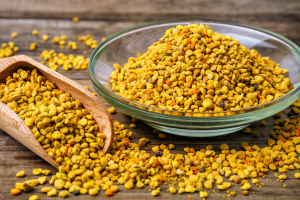Flower pollen

Flower pollen surpasses many of the best brands of pharmaceutical supplements in a number of its properties. In its composition, pollen contains quantitatively and qualitatively balanced proteins, sugars, fats, minerals, vitamins, enzymes, phytohormones and antibiotic-like substances, which allow using it as an adaptogen and immune stimulator for the prevention of many human diseases.
According to the content of nutrients pollen is much richer than honey. Its protein content can reach 30%, and about 13% of amino acids (alanine, glutamic acid, phenylalanine, tryptophan, cystine, proline, aspartic acid...), which is 5-7 times more than in the richest food products, such as milk. Ten of them are not produced by the body itself and must come with food! In its amino-acid composition, 100 grams of pollen correspond to about 500 grams of beef or 7 chicken eggs. The pollen of rose, St. John’s wort, white and meadow clover, plum, black mustard, phacelia, willow, and blue cornflower are the richest in protein.
Not to burden you with reading a truly impressive list of diseases in which pollen is not only useful, but can even be recommended as a complementary treatment, consider the mechanism of its action on the body. Thanks to flavonoids, pollen has capillary-strengthening, anti-inflammatory, anti-atherosclerotic, radiation protective, antioxidant, choleretic, diuretic and anticancer properties.
Due to enzymes, helps reduce bad cholesterol, strengthens the walls of blood vessels, and therefore can be used as a preventive agent in diseases of the cardiovascular system: such as heart attack, stroke, hypertension, coronary heart disease, tachycardia and arrhythmia.
Effectively used during recovery from serious illnesses, chronic alcoholism and withdrawal from drinking disorders. In the treatment of colds and infectious diseases: by stimulating the immune system, increases mental and physical activity. Due to the high zinc content, which enhances the formation of sperm, increases sexual potency and improves sperm quality, and thanks to the iron content, taking pollen increases the level of hemoglobin in the blood and helps with anemia.
Contained in the pollen pantothenic acid helps to prevent depression, improve metabolism and is a component of the prevention of insomnia, problems with the skin, nails and hair. As a source of useful substances and energy, pollen is used in dieting and fighting overweight. It is included in compositions for the treatment of eye diseases, for the normalization of the psycho-emotional state and to reduce fluctuations.
Pollen is contraindicated in diabetes, allergies to honey and plant pollen itself. People with hormonal disorders should use it with caution. Children under 3 years old are also not recommended to take pollen.
Pollen tastes sweet, has a pumpkin-honey aftertaste and may slightly tingle on the tongue. Pollen may be eaten alone or in combination with other foods: yoghurt, porridge, muesli, cottage cheese, juice, or even on a butter sandwich. You should not take pollen on an empty stomach and especially in the evening before going to bed (because of its stimulating effect on the body). The pollen capsules are simply taken with water. For the most effective pollen treatment, after a 30-day course of reception it is necessary to make 2-3 months break, and then the course can be repeated. Pollen should be stored for no more than one year in a dry room at a temperature of 0 to +15° C, in tightly closed containers with no access to oxygen and low humidity.